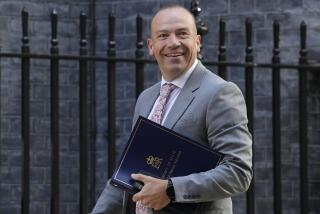Alfonsin Backs Amnesty Bill for Military
- Share via
BUENOS AIRES — Bowing to fierce and unflagging military pressure, Argentine President Raul Alfonsin asked Congress on Wednesday for urgent passage of a law that would prohibit prosecution of most officers charged with torture, murder and other human rights abuses.
The action, a major but reluctant shift in government human rights policy, was intended to short-circuit military unrest triggered by trials of officers for their actions during the so-called dirty war of 1973-82, in which at least 6,000 people were kidnaped and murdered by security forces.
Amid continuing military intransigence that erupted publicly into a 100-hour Easter rebellion by middle-rank officers, Alfonsin portrayed Wednesday’s initiative as a gesture of reconciliation. Human rights advocates called it a surrender of principles.
“I know perfectly well that as a result of this law, the perpetrators of very grave crimes can remain free. I don’t like it,” Alfonsin said.
He insisted, however, that principal responsibility must rest with those who conceived the repression and not with those subalterns who carried it out.
As human rights activists demonstrated outside, the lower house of Argentina’s Congress met Wednesday night to debate legislation that “presumes, without accepting evidence to the contrary,” that subalterns who committed abuses acted “under the principle of due obedience” to orders and therefore cannot be tried. Government supporters said they had the votes to win passage.
The law would effectively exempt officers who were below the rank of colonel during the military’s repression of Marxist guerrillas. Such officers, who are now majors and colonels, had long pressed for such action.
Perhaps most crucial for the stability of Alfonsin’s democratic government, the legislation makes prosecution unlikely for virtually all officers now on active duty, since most colonels and generals of that period are retired.
Rights Group Objects
“The bill defining ‘due obedience’ aggrieves the ethical conscience of the nation and compromises the credibility and respectability of an institutional system which must, as a first priority, reinforce justice,” said the Center for Legal Studies, Argentina’s most respected human rights group.
Matching the military pressures against Alfonsin have been demands from the political center and the left for across-the-board trials.
An opinion poll published this week by the news magazine Somos showed that two-thirds of the respondents opposed any concessions to the armed forces on the human rights issue.
Alfonsin returned democracy to Argentina in 1983, ordering human rights trials that sent two former presidents and three other former junta members to jail. Counter-pressures by the military spilled into headlines last month.
“The risks we ran during the Easter crisis were immense,” Alfonsin said in a measured and stark nationwide address Wednesday afternoon. “Our country was close to a confrontation whose consequences still shake us. We were almost at the brink of civil war.”
On Easter Sunday, rebellious officers led by a lieutenant colonel laid down their arms only after a personal confrontation with Alfonsin. By the time the rebellion had eased, it was clear not only that support for the rebels was much broader than the government at first believed but also that no other officers were prepared to suppress it by force.
In the aftermath, Alfonsin oversaw a housecleaning of the corps of army generals but without successfully stifling the resentment among officers who believe themselves victimized for having carried out orders in a war without rules.
A failed government attempt earlier this year to limit prosecutions by setting a deadline for filing charges produced instead a wave of new cases against more than 200 officers.
More to Read
Sign up for Essential California
The most important California stories and recommendations in your inbox every morning.
You may occasionally receive promotional content from the Los Angeles Times.










